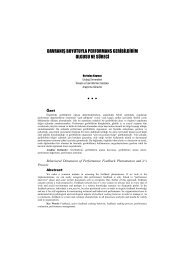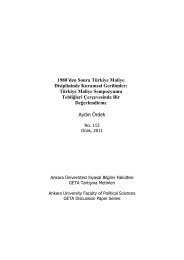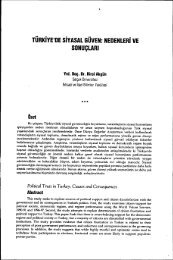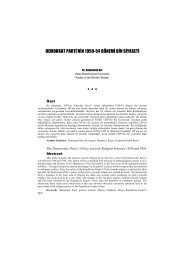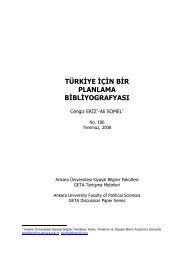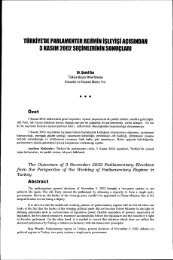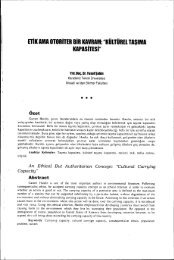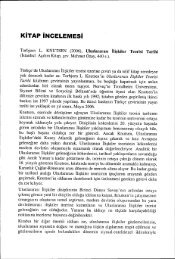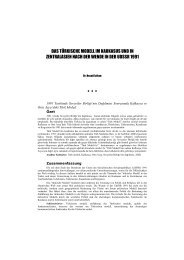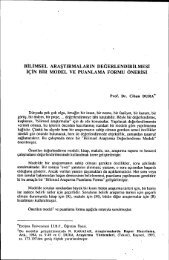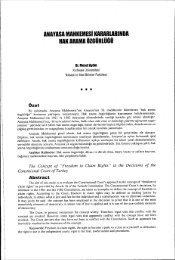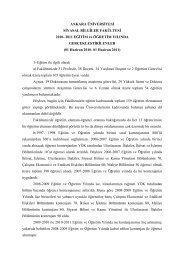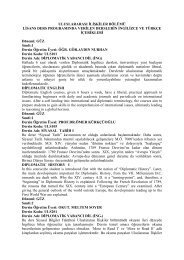ıBN KHALDUN'S PHILOSOPHY OF HISTORY: THE RISE AND FALL ...
ıBN KHALDUN'S PHILOSOPHY OF HISTORY: THE RISE AND FALL ...
ıBN KHALDUN'S PHILOSOPHY OF HISTORY: THE RISE AND FALL ...
You also want an ePaper? Increase the reach of your titles
YUMPU automatically turns print PDFs into web optimized ePapers that Google loves.
. ,J;AIBN <strong>KHALDUN'S</strong> <strong>PHILOSOPHY</strong> 189And man who was too weak to keep the original faith experience aliyehad to revert to the inescapable grimness of cyclical existence. Here theIslamic community could have escaped the cycle: by holding fast to thelaws of God and the new religion, and by avoiding materialism and greedand corruption. Their sinful failure- to do so resulted in their loss of freedomand their inevitable dedine.Before i ı:onclude with some remarks on the question of the "secularism"and hence the whole q:uestion of the "modernity" of Ibn Khaldun,let me say that Ibn Khaldun's ideas were in some ways too realistic andhence revolutionary for the intellectually stagnant society in which helived and worked. There is very little evidence that he had any impacton Arab thought in the Iate 14th or early 15th centuries. it was only inthe 16th and particularly in the 17th centuries that an Ibn Khaldun rediscoverygot underway, and the. people who rediscovered and read andcommented upon him were the Ottoman Turks. The Ottomans, as youknow, concentrated much of their intellectual interest upon historyandpolitical thought, and they were fascİnated with Ibn Khaldun. In the16th, 17th, and 18th centuries, the study of Ibn Khaldun constituted animportant segment of Turkish intellectual history. it was only in the19th century that Europa joined the Turks in reading Ibn Khaldun.You will agree with me that, as ıbn Khalc;un grasps that fundamentaland specific element which constitutes political reality, he comes acrossas arealist. In his description of the rise and fall of Islamic societies andcultures, in his analysis of Islamic states, this political realism, this interestin the concrete manifestations of social and political entities givehis work a much more "modern" flavor than is to be found even withmany present-day Muslims writers who are generally -more theocı:atic/utopian in their- id~as. Yet, when it comes to the relationship of religionand politics, there is a tremendous distance between Ibn, Khaldun's politicalpragmatism and, let's say, Machiavelli's political philosophy. AsMachiavelli ponders the rise and fall of nations and cultures in his Dİscoursesand in The Prİ'ııce, he also relies on religion as the main sourcefor social solidarity. Paradoxically, he actually does so to an even higherdegree than Ibn Khaldun. Without religion, says Machiavelli, nationscannot develop "virtue" (political strength and cohesiveness) since it isonly on the basis ıof observed religion that good institutions can be establishedwhich then restrain individual selfishness and thus ensure th2supremacy of the common good. In other words, Machiavelli sees religionas political1y useful. However, he is not concerned with religion as GodgivenTruth and Law, not does he seethe corruption of religion as aresu1t of human weakness, and sin. Both the rise and fall of religion to



